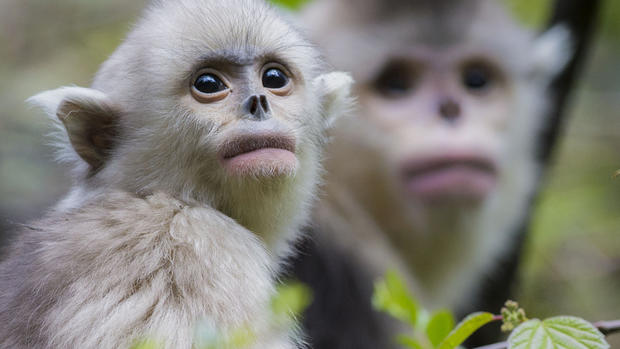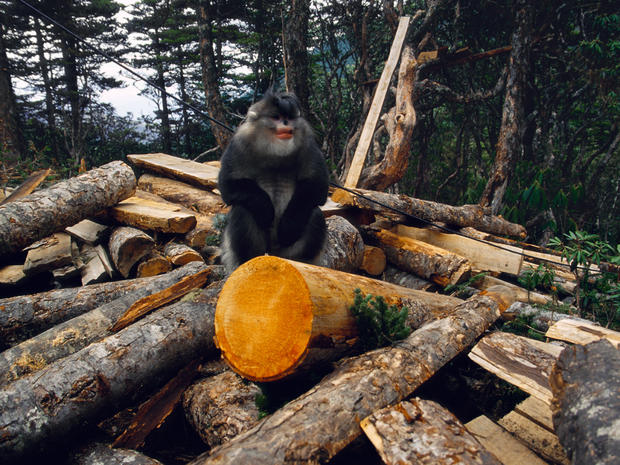How a monkey helped launch China's conservation movement
The words MONKEY BUSINESS usually suggest something silly and frivolous, but for pioneering conservationists on the other side of the world, the business of monkeys is very serious business indeed. Seth Doane teamed up with students from the University of British Columbia's Global Reporting Centre for our Cover Story:
Trekking through the mountains in this remote corner of China not far from Tibet, the young filmmakers are in search of an elusive subject.
"This is a long hike to get up here not to see anything," said 25-year-old wildlife photographer Jacky Poon, as they hiked through a snowstorm.
They're trying to spot a rare "snub-nosed monkey," which often means enduring grueling conditions and subzero temperatures, only to be disappointed.
"I'm trying to film some landscape, [which is] proving to be not easy," said Poon.
It can take weeks to find them, and can involve waiting for hours at a time.
In the end, the filmmakers found families of monkeys in an area where it's easier for "trackers" (who know the monkeys' patterns) to spot them.
There are just about 2,000 of these monkeys left in the wild. They live in a tiny part of a forest in China's Yunnan Province -- one of the last unspoiled regions left in a country where wilderness is fast disappearing.
These monkeys live at a higher elevation than any other primate on Earth. So spotting them is a thrill, says Poon.
"How is that, to get so close to an animal, something in the wild?" asked Doane.
"I can't really explain it," replied Poon. "For me, the feeling is like jumping out of an airplane. I get shaky, I'm trying to control that nowadays because I got to film. You can't shake while you film, right?"
Poon was born in Hong Kong and studied in England. His parents wanted him to focus on math, physics or business. But his focus changed when he came across the work of a pioneering Chinese photographer named Xi Zhinong.
"His passion of filming these monkeys is incredible," said Poon. "He went out into the mountains, lived there for three years, and saw the monkeys twice! That is some passion there!"
In 1993 Xi Zhinong was a photographer for the Chinese Forestry Bureau who'd been assigned to record wildlife for government documentaries. Xi captured the first photographs ever taken of the snub-nosed monkey. Most Chinese had never seen one, and the photos became a sensation.
They also served as a warning.
"After these were published and gained international attention," Xi told Doane through an interpreter, "the monkeys' fate was changed.
"No one knew there was a kind of monkey who has red lips and pink face like us humans. When they first saw these pictures, they were like, 'Wow, how can we sit and watch these cute animals go extinct?'"
With the economy starting to take off, logging interests were destroying the monkeys' limited habitat. Xi's photos sounded the alarm.
There was a public outcry, and the government listened. The snub-nosed monkey became a species as protected as the panda.
It was a victory that many say signaled a turning point: The birth of a conservation movement in China.
When asked how instrumental Xi was to saving the snub-nosed monkey, Poon said, "He's done a hell of a lot. He's doing something that no else has done before, to bring conservation ideas into China before everyone else starts."
For decades in China, the environment took a back seat to development. Beginning in the late 1970s, leader Deng Xiaoping opened China to the West and foreign investment.
Conservation, says Poon, was not the priority. "It's a developing country not long ago, so people were still, you know, trying to make their living. And it's hard to tell people, 'Save an animal,' when they can't even feed themselves properly."
But as China began to prosper, a fledgling environmental movement took hold. When Xi took his photos 20 years ago, there were just nine environmental groups registered in China. Today, there are nearly 8,000 such organizations.
And an ecotourism industry has even started to grow around these revered monkeys.
Jacky Poon is one of those following in Xi's footsteps. He's working on a film for an upcoming "PBS Nature" series about these unusual primates.
"We've been following them for the past nine months or so, and we know most family individuals," Poon said, "but not the all-male group."
He says that, to protect them, there's still a lot more work to be done in a booming, polluted modern China. A new government report says in the first part of 2014, only nine of the 161 cities that monitor air quality met standards.
And in 2013, there were more smoggy days than in any other in the last half-century.
Poon hopes his film will further inspire a new, more prosperous, more globally connected generation of Chinese conservationists -- much as Xi's original photos inspired him.
"What I really want people to do -- and I know the younger generation is getting so much better, and they want to learn and they want to protect -- what I would like them to do is to influence their parents, influence their grandparents, because we don't really have much time," Poon said.
For more info:

